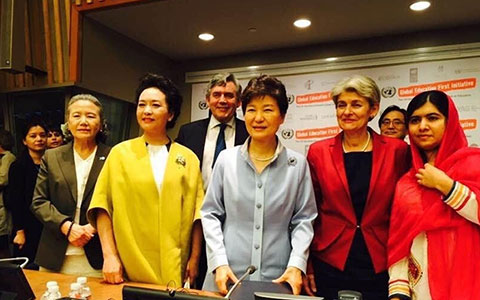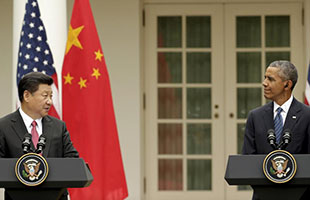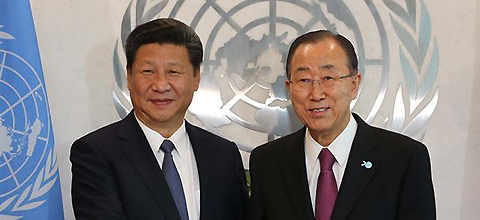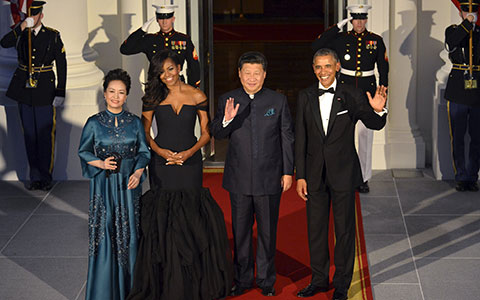Translators must master Mandarin first
Updated: 2015-09-28 04:04
By LI JING in New York(China Daily USA)
|
|||||||||
UN expert says native-tongue expertise key
Mandarin is one of the six offi cial languages of the United Nations, and translating documents into all those languages is crucial to the smooth function of its machinery.
What makes translating at the UN particularly challenging, though, is that what it produces goes beyond the conference room. Translations of major documents are often cited by the media, quoted in statements, and incorporated into legislation for years to come.
Ma Xuesong is one of the people who ensure accurate translations. He joined the UN in 2000 after 12 years of diplomatic service with China’s Foreign Ministry and has led the Chinese Translation Service since 2011.
The service, part of the Documentation Division, is responsible for translating offi cial documents, meeting minutes, and correspondence into Chinese at the UN’s New York headquarters. The documents can cover a broad range of technical, political, scientific, social, economic and legal issues.
“In the service, translators are exposed to a wide variety of texts on a daily basis. Mastering the various topics, and the terminology used in translating these topics, can be a daunting challenge,” Mr. Ma said, adding that it means a lot of hard work, especially in the fi rst few years.
“Because of the variety of subjects and the specificities of the organization, you feel like you have to learn everything anew,” he said. “The consistency required by institutional translation also creates a certain degree of tension between individuality and creativity. There is no room for mistakes. “If there was a mistake, it would spread like a virus.”
The documents are a vivid reflection of international relations and global politics, he said, and his team’s goal is to produce translations that are accurate and easily comprehensible, so that Chinese-speaking readers can get fully involved in and contribute to the work of the UN.
“That is the signifi cance of multilingualism, which is essential to achieving international cooperation and understanding,” Mr. Ma said. “The UN is a platform for debate and discussion among representatives of the 193 member states, rather than only countries speaking one or two languages.”
As China’s global projection is having a considerable eff ect in all areas of trade, finance, business and tourism, the country is playing an increasingly important role in the UN In February, for example, China led an open debate on global peace and security while holding the rotating presidency of the UN Security Council.
“China has been more active in intergovernmental meetings and debates and proposing resolutions on issues of global concern,” Mr. Ma said. “At the same time, issues discussed at the UN have become more China-related. China, as the second-largest economy and the most-populous nation, also plays a key role in the achievement of UN targets, such as its millennium development goals.”
This growing responsibility and involvement in the UN means more challenges and hard work for Mr. Ma’s staff .
“We have to deal with a variety of texts from any number of areas of expertise under strict deadlines. Every weekday, we have to wait until 7 in the evening before going home, just in case any important documents need to be issued overnight.”
Mr. Ma recalled he had nine people translating at the 2012 UN Conference on Sustainable Development, known as Rio+20, handling about 30,000 words over three days. “We managed to reach the best possible equilibrium between quality and timelines. I think we had a very good outcome.”
His staff has 70 people from diverse educational backgrounds, and he said they are all expected to specialize in certain subjects dealt with by the UN “It requires a lot of experience and institutional memory,” he said.
“Besides common sense, (translators) should know the UN documents well, … and often they have to mull out the right meaning of texts written by people who are mostly nonnative writers.” One of his senior advisers, he said, studies legal documents in great depth and reads every Chinese legal publication he can fi nd to keep up to date in the field.
Changes in policy have also meant younger Chinese are now interested in joining the peacekeeping organization, he said. Unlike the 1980s and ’90s, when Chinese people working for the UN were on a fi ve-year rotation basis, they now are able to work from their early 30s until retirement.
“That has inspired and encouraged the younger generation to work at the UN, and it also means Chinese have better chances to reach more important positions in the organization.” However, people still tend to pay more attention to learning English than improving their native language, he said.
“Translation work requires a perfect command of the mother tongue, which is the most important competence. Translators are able to use various electronic tools for their work, but they must rely on their extensive language skills and substantive knowledge to produce documents that are clear and coherent.”
- Dogs surf in contest in California
- France launches air strikes against Islamic State in Syria
- LatAm experts praise Xi on yuan, globalization
- Women's rights are human rights, German chancellor says
- Hajj death toll rises to 769, Iran denounces 'crime'
- Russia's military build-up in Syria reinvigorates political solution
-
 China's first lady unveils stamp honoring disabled
China's first lady unveils stamp honoring disabled -
 Xi makes four-point proposal on promoting women's rights
Xi makes four-point proposal on promoting women's rights -
 China gifts the UN 'Zun of Peace' for 70th anniversary
China gifts the UN 'Zun of Peace' for 70th anniversary -
 Xi calls for equitable, open, all-round development
Xi calls for equitable, open, all-round development 
 First Lady Peng delivers speech in English at UN
First Lady Peng delivers speech in English at UN
 Three Xi-Obama meetings: From casual to black tie
Three Xi-Obama meetings: From casual to black tie
 Xi pledges $2 billion to help developing countries
Xi pledges $2 billion to help developing countries
 White House hosts state dinner for President Xi
White House hosts state dinner for President Xi
Most Viewed
Editor's Picks

|

|

|

|

|

|
Today's Top News
Xi pledges $2 billion to help developing countries
Young people from US look forward to Xi's state visit: Survey
US to accept more refugees than planned
Li calls on State-owned firms to tap more global markets
Apple's iOS App Store suffers first major attack
Japan enacts new security laws to overturn postwar pacifism
Court catalogs schools' violent crimes
'Beauty of Beijing's alleys akin to a wise, old person'
US Weekly

|

|








